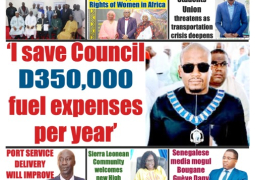
“As we convene to reflect on the strides made through the Women Political Leadership (WPL),
I am reminded of the reality that while women constitute more than half of our population and 57 percent of the registered electorate, their representation in leadership and decision-making remain disproportionately low,” she pointed out.
Currently, women occupy only 9 percent of cabinet positions and 8.6 percent of the National Assembly seats. At the community level, women's representation in local councils is critically low, with only 8 out of 120 councilors being women.
She observed that this underrepresentation not only hinders gender equality but also limits the diverse perspectives necessary for effective governance.
“As we move forward, it is imperative that we create an enabling environment that empowers women to take on leadership roles and actively participate in political processes,” she urged.
“These statistics underscore the urgent need for transformative action: The WPL Project, funded by the Peacebuilding Fund, has been an important initiative in addressing this challenge. Through its interventions, we have witnessed notable progress, including the appointment of women to District Tribunals, the election of women councilors, and the historic appointment of female governors.
These achievements are not just milestones but symbols of the potential for sustainable and inclusive governance when women are empowered to lead.”
She added: “It is essential that we engage all partners ranging from grassroots women leaders to governmental and civil society organisations to discuss strategies for sustaining this momentum beyond the WPL Project.”
“Our collective commitment to fostering an inclusive political landscape is crucial for achieving the Sustainable Development Goals, particularly SDG 5, which aims to ensure women's full and effective participation in decision-making processes,” she said.
Hon. Kinteh highlighted that we must continue advocating for legislative reforms and support mechanisms that facilitate women's political participation.
“I am reliably informed that the Women Political Leadership (WPL) Project in The Gambia has made remarkable strides in advancing women's participation and leadership in political and decision-making processes, contributing significantly to bridging the gender gap in governance,” she said.
Through targeted interventions, the project has worked to empower women, foster their representation in leadership roles, and transform societal attitudes toward women in politics.
“One of the project's notable successes has been the appointment of over 15 women to District Tribunals across the country.”
“This achievement marks a critical step toward amplifying women’s voices in legal and community matters, showcasing progress in dismantling gender barriers within local governance structures,” she further observed.
Despite ongoing challenges, she said, these appointments symbolise a shift toward inclusivity in decision-making at the grassroots level.
“My ministry with support from the government of The Gambia and development partners recently launched the National Gender Policy of The Gambia for 2025-2034, which represents a transformative approach to advancing women's representation in leadership and promoting gender equality across all spheres of national development.”
“At its core, the policy establishes a strategic framework to embed gender equality into governance, education, economic growth, and other critical sectors, ensuring that women's rights and opportunities are prioritised as essential to the country's progress.”
“Central to this policy is the empowerment of women through enhanced access to education, healthcare, and economic resources.”
“By equipping women with the necessary skills and confidence, the policy envisions a future where they can actively and effectively participate in leadership roles.”
“Specific measures are proposed to boost women's representation in decision-making processes, including setting clear targets for political offices and extending support to female candidates during elections.”
Mr. Karl-Frédérick Paul, UN Resident Coordinator, said this initiative funded by the United Nations Peacebuilding Fund and implemented by UNDP, UNFPA, and UNICEF, has been a transformative journey, laying the groundwork for a more inclusive, equitable, and empowered Gambia.
He said among the remarkable achievements is a 78.3 per cent increase in women’s participation in local government elections, as well as a rise in the number of women appointed to District Tribunals – from 5 to 23. “The Women Political Leadership project was built on three key pillars: strengthening national legislation and political party bylaws, building stakeholder capacity to enhance women’s leadership, and empowering aspiring women political leaders.”
“This multifaceted approach has yielded tangible results, including strengthened legal frameworks, increased advocacy for policies like the Women’s Reservation Bill, and heightened awareness through dialogue with traditional and religious leaders.”
“In addition to these systemic gains, the project established impactful initiatives such as the Women’s Resource Centre, which provides mentorship and capacity building, and the GAMBIFoods Processing Centre.”




